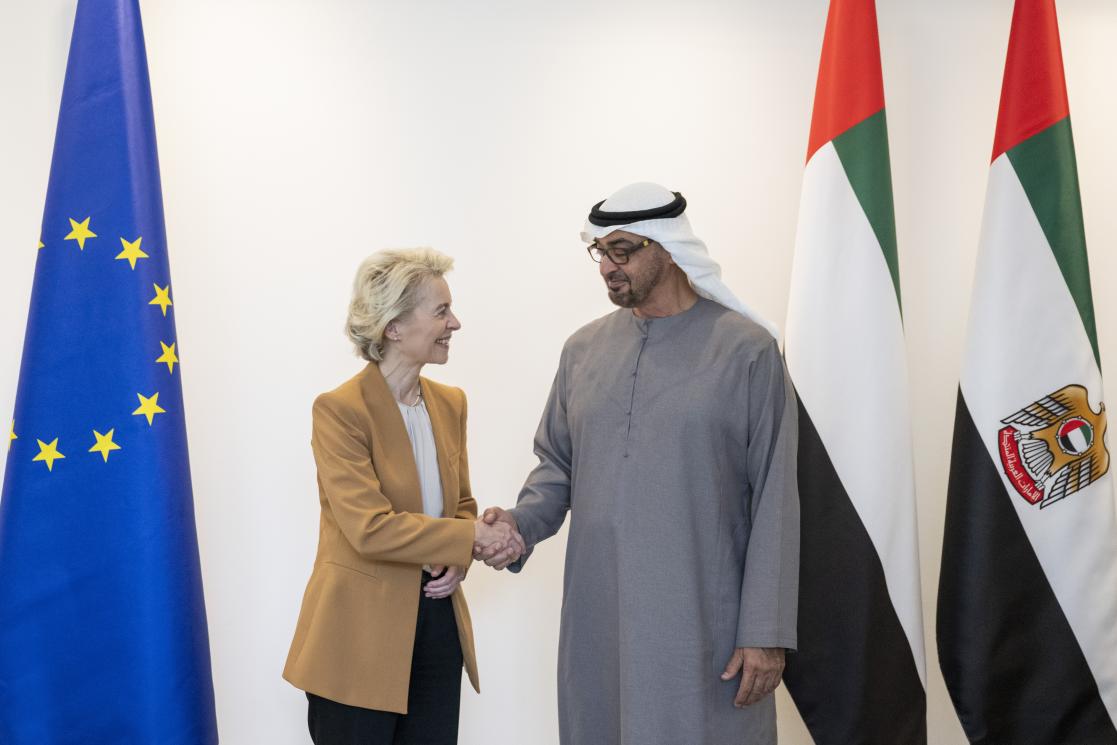The European Union and the United Arab Emirates
An overview of political and economic relations between the European Union (EU) and the United Arab Emirates (UAE).
Political Relations

The EU and the UAE have developed a diplomatic relationship centred on common political and regional interests. The UAE also hosts the embassies of 26 EU countries.
Bilateral relations between the United Arab Emirates and the EU are based on a mutual interest for regional stability, security, economic cooperation and humanitarian assistance.
The EU Delegation in Abu Dhabi has a wide network of partners in the UAE, including government bodies, non-governmental organisations, universities, business organisations, research centres, media establishments. This network allows the Delegation to resonate EU messages, build cooperation and synergies with local initiatives and priorities, while better understanding the values and culture of the United Arab Emirates.
One of key aspects of the EU-UAE relations are regular Political and Human Rights Dialogues which cover the most fundamental issues, pertaining to our bilateral cooperation, such as peace and security, human rights, trade and investment, sustainable development, education and training, and science and technology.
For more information:
Trade and Economic Relations

EU
The UAE is a very important economic partner for the EU. The country is the EU’s first export partner and first investment destination in the MENA region, as well as a major regional trade and logistical hub for EU operators. The EU remains the UAE’s second most important trading partner.
Bilateral trade and investment continue to grow. In 2024, the volume of bilateral trade in goods reached EUR 55.6 billion (while bilateral trade in services exceeded EUR 39 billion in 2023) which makes the EU the second-largest trade partner of the UAE globally.
In May 2025 the EU-GCC Free Trade Agreement (FTA) negotiations were officially launched. The agreement aim to create a comprehensive framework for economic cooperation and will enhance bilateral trade and investment relations in various strategic sectors, such as renewable energy, AI/digitisation, services and raw materials as well as at developing closer regulatory cooperation including on customs, standards and protection of intellectual property rights. The first round of negotiations on the EU-UAE FTA began on 24 June 2025 followed by engaged talks in the second half of the year.
In December 2025, the EU and the UAE launched negotiations for a Strategic Partnership Agreement with the United Arab Emirates. This new bilateral framework of cooperation aims to enhance cooperation on key sectoral policies of mutual interest such as regional security, economic diversification, energy, AI, research and innovation, judicial cooperation, education and culture as well as people to people contacts.
People-to-People Exchanges

EU Delegation to the UAE
Cultural and educational links are a cornerstone of the EU-UAE partnership, fostering mutual understanding, shared values, and long-term collaboration. The EU works closely with local institutions to promote meaningful people-to-people exchanges through a wide range of cultural, academic, and public diplomacy initiatives.
The annual European Film Festival in Abu Dhabi, now an established event, brings European movies to local audiences while offering workshops and masterclasses that benefit emerging filmmakers and students. These events not only showcase the diversity of European culture but also provide practical learning opportunities and foster dialogue between our communities.

EU
The Delegation also marks important milestones such as Europe Day and the European Day of Languages, bringing the richness and diversity of European culture closer to UAE audiences. In collaboration with universities and youth organisations, the EU regularly hosts other activities and events such as roundtables, lectures, panel discussions, essay competitions, career talks, Model EU simulations, and hackathons, which inspire dialogue, education, and provide insight into European values, institutions, and opportunities.
In addition, academic partnerships and cultural programmes continue to strengthen mutual understanding. These initiatives help promote shared values and support the development of local talent, while also highlighting our collective commitment to education and cultural exchange.
